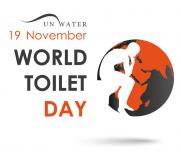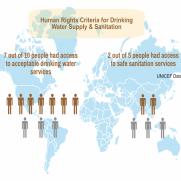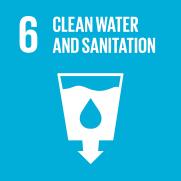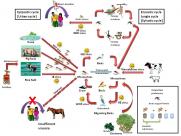 IWA Development Congress - Open Access Waiver Competition
IWA Development Congress - Open Access Waiver Competition
In honor of this year's IWA Development Congress in Buenos Aires, we gave delegates the chance to win a 100% fee waiver to publish their paper Open Access in any one of our 12 IWA Journals.
...
 World Toilet Day article collection: free access for limited time
World Toilet Day article collection: free access for limited time
To celebrate World Toilet Day, IWA Publishing compiled a collection of recent relevant papers that will all be free to access until December.
 Translating Human Rights criteria into operational terms
Translating Human Rights criteria into operational terms
Translating the Human Rights criteria into action is a challenge for water and sanitation professionals, particularly for regulators. Mohamed Tawfik and the IWA Communications department for Water Policy and Regulation have procvided a helpful outline and infographics to illustrate some of the key criteria & principles in relation to drinking water supply and sanitation services.
 What needs to change to achieve access to sanitation for all by 2030?
What needs to change to achieve access to sanitation for all by 2030?
Andrés Hueso, Senior Policy Analyst for Sanitation at WaterAid, discusses the opportunities and challenges involved in global prioritisation of sanitation and water for all.
Measuring Willingness-to-Pay for Water and Sanitation by People Living with HIV and AIDs in South Africa
Journal author Dr Ephias M. Makaudze outlines the significance of his studies into the importance of clean water and safe sanitation to people living with HIV and AIDs in South Africa, where rising urban slum population increasingly strains the resources of local municipalities.
 The Zika virus: we should expect more like it!
The Zika virus: we should expect more like it!
Robert Armon, author of the comprehensive book: Environmental Aspects of Zoonotic Diseases (2012), sheds light on the global problem of flaviviruses such as Zika. He notes that this recently publicised disease is just one example of many severe viruses that could flourish in the right environmental conditions.
A Brief History of Water and Health from Ancient Civilizations to Modern Times
Water is life – and life on earth is linked to water. Our existence is dependent on water, or the lack of it, in many ways, and one could say that our whole civilization is built on the use of water. This article examines the influence of water on public health throughout history. Farming and the development of settlements lead to the beginning of the problem that faces mankind today – how to get drinkable water for humans and cattle and how to manage the waste we produce. The availability of water in large quantities has been considered an essential part of civilization throughout the different periods: Roman baths needed a lot of water, as do the water closets and showers used in current Western civilization. The importance of good quality drinking water has been established for years. However, the importance of proper sanitation was not understood until the 19th century.
Water-based diseases
Waterborne diseases are caused by pathogenic microorganisms which are directly transmitted when contaminated fresh water is consumed. Contaminated fresh water, used in the preparation of food, can be the source of foodborne disease through consumption of the same microorganisms. According to the World Health Organization, diarrheal disease accounts for an estimated 4.1% of the total DALY (diability-adjusted life year) global burden of disease and is responsible for the deaths of 1.8 million people every year. It was estimated that 88% of that burden is attributable to unsafe water supply, sanitation and hygiene, and is mostly concentrated in children in developing countries.
Simple Options to Remove Turbidity
The health consequences of inadequate water and sanitation services include an estimated 4 billion cases of diarrhea and 1.9 million deaths each year, mostly among young children in developing countries. Diarrheal diseases lead to decreased food intake and nutrient absorption, malnutrition, reduced resistance to infection, and impaired physical growth and cognitive development. Since 1996, a large body of published work has proven the effectiveness of interventions to improve water quality through household water treatment and safe storage (HWTS) at reducing diarrheal disease. However, not all of these interventions remove the turbidity that causes water to look dirty. Although the following options are not proven to reduce diarrheal disease incidence on their own, they can be used to pre-treat water to reduce turbidity before the use of household water treatment products. These options mechanically (through filtration) or chemically (through flocculation and settling of suspended material) remove particles and reduce turbidity. These pre-treatment methods may also increase the efficacy of household water treatment products by removing contaminants that interfere with disinfection and physical filtration processes.
Helminth eggs
Helminth eggs are the infective agents for the types of worm diseases known globally as helminthiases. Although helminths are pluricellular animals their eggs are microscopic (around 20 to 80 μm for those that are important in the sanitary field) and are contained in variable amounts in wastewater, sludge and excreta. Helminth eggs infect humans through: (1) the ingestion of food crops polluted with wastewater sludge or excreta, (2) direct contact with polluted sludge or faecal material, and (3) the ingestion of polluted meat or fish.